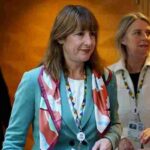The BBC is preparing to restructure its evening news and current affairs output as it faces a significant drop in licence fee revenue.
The broadcaster lost 300,000 licence fee payers last year, creating substantial financial pressure. In response, BBC executives have requested that Ofcom modify the corporation’s peak-time programming requirements.
Currently, Ofcom regulations require the BBC to broadcast at least 450 hours of news and current affairs content annually across BBC One and BBC Two. Of these, 106 hours must air during peak viewing hours (6pm to 10:30pm), with a minimum of 45 hours specifically on BBC One.
The BBC is proposing a different approach: replacing the peak-time quota with a requirement to produce 70 hours of original current affairs programming, while maintaining the overall 450-hour annual total. The broadcaster acknowledges this change could lead to more repeats during primetime slots, though it maintains that original programming levels will not decrease.
BBC leadership argues that traditional peak-time quotas are becoming outdated as audiences increasingly turn to BBC iPlayer for flagship programs like Panorama. Ofcom has indicated it may approve the change, recognizing the need for regulations that reflect modern streaming habits.
These proposed changes come as the BBC implements broader cost-cutting measures. Last year, the corporation announced 155 job cuts in its news division to save £24 million—approximately 4% of its annual budget. Recent casualties include the HardTalk interview series, the Asian Network news service, and various radio news bulletins on stations including Radio 5 Live and Radio 2.

BBC News CEO Deborah Turness described the cuts as necessary to “balance the books.” The measures form part of Director General Tim Davie’s wider initiative to save £700 million, addressing a funding gap created by a 30% real-terms decline in licence fee income between 2010 and 2020.
A BBC spokesperson stated: “These proposals reflect changing viewing habits and aim to focus on delivering new, high-quality content while achieving greater value for money for licence fee payers.”RetryClaude can make mistakes. Please double-check responses.






